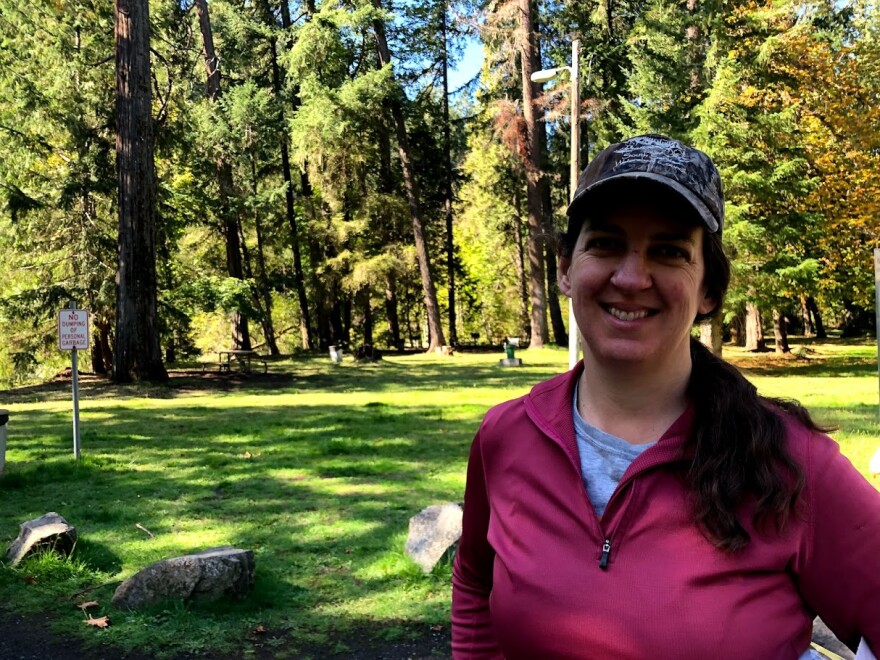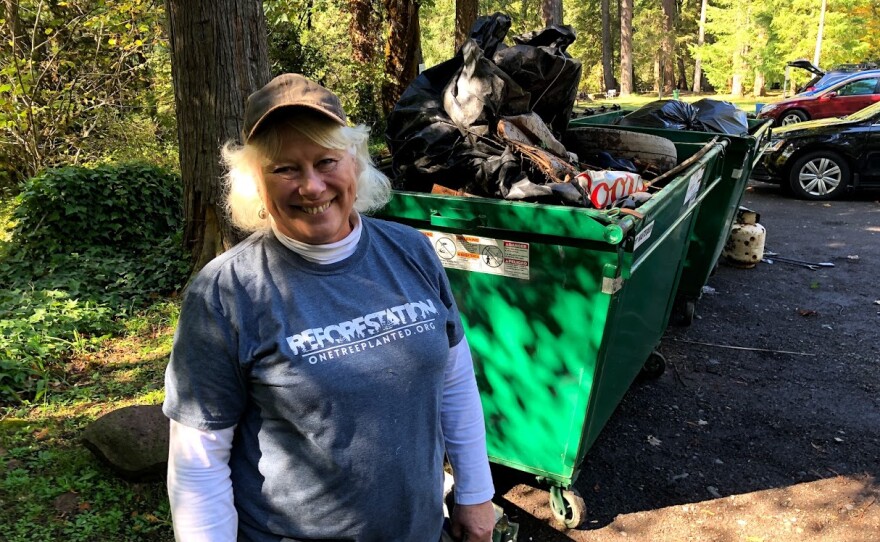The waste and refuse left at homeless encampments has been an issue for many local governments, including the City of Eugene. Earlier this summer we reported on ongoing efforts to clean up several islands in the Willamette River. But it’s also a problem beyond city limits. Recently, KLCC’s Brian Bull ventured out into the Willamette National Forest to check on clean-up efforts there as well.
“Good morning, anybody home?” calls Paul Wagner. About 40 yards in from the Willamette River near Oakridge, the clean-up volunteer nears a campsite. A faded orange tent sits next to a pile of mud-caked griddles and pans, along with what might have once been a beanbag or easy chair. A rotting smell looms over the site.

“Anybody home?” he repeats. There's no answer.
The odor intensifies when Wagner opens the tent. Moldy clothes, spoiled food, and a soggy floor mottled with mildew greet him. He pokes through a cardboard box with a long pincer.
“I found an open carton of milk. And eggs. Bet they’re good. Whew.…"
It’s unclear how long the campsite’s been here. Some in this volunteer clean-up crew guess half a year, maybe longer.

Chloe Goldade-Holbrook, a natural resource specialist with the Middle Fork Ranger District, approaches Wagner and the tent. She removes a bright orange sticker - a USDA/USFS warning notice for abandoned property - from her coat.
“Maybe we can throw the sleeping bag in the tent, and take the whole thing…” suggests Wagner.
"Gotta leave the tent for right now," says Goldade-Holbrook. "So there’s the orange sticker that I’ll write on there, I’ll put the date on it, and I’ll put it on the tent, and we’ll come back in a couple weeks, and if the tent’s still here with the orange sticker, it means it’s truly abandoned, and then we’ll remove the tent.”
Later, at a gravel lot near Salmon Creek, Chiara Cipriano of the Willamette National Forest slides on a pair of blue latex gloves. She helps Goldade-Holbrook bag trash found in the tall grass. The pair share what they're finding.
“Ooh, gosh! Lots of shotgun shells, shot up cans…"
"We have some broken glass just behind me, uhm, sometimes there can be drug paraphernalia, there can be human waste."
"Broken bottles, Styrofoam…"
"Chemicals, propane tanks, and all of this can pose a risk of course, to visitors and to the watershed and ecosystem.”

People can legally camp for 14 days in most areas of the forest, though some obviously stay well past that limit. With 1.6 million acres of land, it’s hard to enforce camping rules and monitor trash, hazardous materials, and human waste that can pile up at many non-recreational campsites.
“Currently, the Willamette National Forest is spending about $250,000 just reacting to the issue. Through law enforcement time, just the cost of hauling of waste, and none of this money is accounted for in a budget line so it has to come from other program areas.”
The U.S. Forest Service in Colorado Springs reports that it costs $700 to $1,000 to clean up each individual non-recreational campsite. With homelessness a growing problem in many parts of the country, the potential for environmental degradation in outlying rural and forested areas also increases.
Recently during the annual Great Willamette Cleanup event, Oakridge Mayor Kathy Holston watched two dumpsters in a local park get stuffed to capacity, with nearly 30 bags of trash gathered by twenty volunteers.
“Here comes another truck! Yay!" laughs Holston. As the vehicle nears, she squints. "Omigosh, I see a dog cage…and some netting….who knows what we’ll find in this one.”
Holston says her community has a warming center, yet some homeless people prefer to stay in the woods…and they aren’t just individuals.

“We have seen a little bit of an uptick in families trying to find a place to be. Now is the time where they start moving around, and trying to figure out, ‘Okay, now where do I go for the winter?’”
While Holston and other volunteers are sympathetic to the plight of the homeless, the issue of garbage and waste left at encampments is a growing concern.
“Circumstances may be beyond their control, but there’s nothing ever beyond the control of throwing away your own garbage.”

Sarah Dyrdahl, Executive Director of the Middle Fork Willamette Watershed Council, says this past year seems especially bad for homeless encampments and trash.
“If there was a way that folks could be informed of places where they could properly dispose of their trash, and then also just proper dispersed camping etiquette, in terms of bearing human waste and making sure that they understand the impacts to the environment that leaving their garbage has.”
WEB EXTRA: Volunteers and forest officials clean up abandoned homeless encampment near Oakridge
Whether Oakridge continues to see the issue improve or not, there seem to be plenty of volunteers eager to keep the area pristine and clean…even if it means their vehicles aren’t after a day’s work.
“My car will never smell the same!” laments Wagner.
“But my dog will love it!” laughs someone.
“Yes, your dog will be happy with the new smells in your car, that’s for sure!” says Dyrdahl.
Meanwhile, the U.S. Forest Service is reaching out to community service groups including the White Bird Clinic to discuss homeless encampments and environmental concerns. The first public working session is November 14th at the City of Eugene’s Public Works Department.
Copyright 2019, KLCC.



















